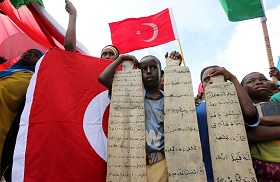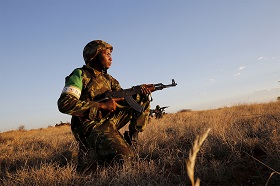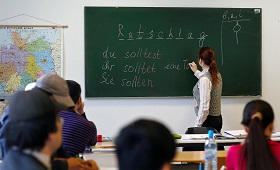The fifth African Union-European Union (AU-EU) summit was held on 29–30 November 2017 in Abidjan, Cote d'Ivoire. The leaders of African and EU countries once again gathered to develop strategic decisions on the future of their cooperation. Interestingly, this is the first time that the summit was held in sub-Saharan Africa.
The EU and African countries’ leaders agreed to support the mobility of students, staff and academics on the African continent. They also agreed to intensify exchange programs between Africa and Europe, such as ERASMUS +.
The EU's External Investment Plan will help maximize the "digitalization" of African economies, as this is a powerful factor in economic growth, as well as the reduction in the "digital gap" between Africa and the rest of the world, providing access for all.
The issue of regulating migration is one of the most controversial, painful in the relations between the EU and Africa. Currently, the bulk of African migrants — 70–80% — moves within the continent, but migration flows outside the continent are beginning to increase.
Within the framework of the EU missions, training is conducted for the armed forces of Mali and Somalia and the police of Nigeria. EU ships patrol the Mediterranean and the coast around the Horn of Africa, countering pirates and traffickers.
Instability in Africa inevitably affects the security and well-being of Europe. Africa needs assistance in ensuring security and development. European aid and investment are important for the progressive development and stimulation of economic growth on the African continent.
The fifth African Union-European Union (AU-EU) summit was held on 29-30 November 2017 in Abidjan, Cote d'Ivoire. The leaders of African and EU countries once again gathered to develop strategic decisions on the future of their cooperation. Interestingly, this is the first time that the summit was held in sub-Saharan Africa. It was also the first time that the meeting was designated as the AU and the EU summit, and not as the EU – Africa summit. In this regard, Federica Mogherini noted that for "probably the first time ever, both sides meet as equals, like true partners, like brothers and sisters, as neighbors."
The theme of the summit was "Investing in youth for a sustainable future." Investing in the future of youth is a key priority for Africa and the EU, since 60% of the African population is under 25 years old, and their contribution to the economic development of the African continent can be enormous if they are provided with the opportunity to receive education, training, get jobs. If this is not done – and now the unemployment rate among African youth as a whole has exceeded 31% – then the great part of these desperate young people might join the ranks of migrants to the more prosperous EU countries, which presents a colossal challenge for the European Union. Moreover, if the unemployment rate among young people in North Africa is lower, about 25%, then in sub-Saharan Africa – 31% and above. According to the Agenda-2063, the global continental development plan, adopted by the AU, in the first ten years of its implementation, the unemployment rate should be reduced by at least a quarter.
It is encouraging to note that the problems of youth at the summit were solved with the active participation of young people – representatives of both continents. One hundred and twenty youth leaders provided an important input for the preparation for the event, taking part on October 9-11 in the 4th African-European Youth Summit in Abidjan. They agreed upon the declaration with the recommendations for the November's "adult" summit. In addition, 36 young people from both continents continued this work based on the adopted declaration within the framework of the initiative of the AU-EU youth plug-in initiative. It is interesting that young people from the African Diaspora also took part in the young people forum. The forum participants agreed that young representatives of the Diaspora have a unique potential to inspire and stimulate positive changes in relations between the two continents. From October 12 to November 29, young leaders developed a youth agenda, which was presented to the leaders of the two continents at the summit. The youth agenda included specific proposals on six priority areas: education and skills; business, job creation and entrepreneurship; governance and political integration; peace and security; culture, sport and arts; the environment and climate change.
Youth leaders, in particular, called on the leaders of the EU and the AU to create a framework for recognizing and validating the competencies received through non-formal education, including within the framework of youth organizations, as well as to Euro-African cooperation in harmonizing quality assessment and accreditation of African higher education. They also support the mutual recognition of evaluation systems and diplomas on formal education between the countries of Africa and the EU to increase mobility of students and young professionals. Young people are also interested in having access to initial capital for starting a business, as well as reducing the age for being elected to political posts.
Proposals developed by youth leaders were taken into account in the joint declaration adopted at the end of the AU-EU summit. In addition, the participants also discussed the implementation of the joint Action plan for 2014-2017 adopted at the previous summit in Brussels three years ago, and discussed the steps that need to be taken to specify the joint AU-EU strategy on the problems that both continents face. Although Africa is expanding its economic relations with other continents, the EU remains the main trading partner and donor of development assistance for the continent.
The joint declaration adopted at the end of the summit reflected initiatives in four strategic areas: economic opportunities for young people; ensuring peace and security; mobility and migration; cooperation in the field of good governance.
It is important that the summit saw presentation of a new EU External Investment Plan (EIP). According to this initiative, the EU established the European Fund for Sustainable Development with a capital of 4,1 billion euro in order to attract private investment from European companies and organizations that would like to work on the African continent and in the EU Neighbourhood and provide them with safety guarantees. The EIP is important, because in general the inflow of FDI and other private capital to developing countries declined after the financial crisis of 2008, and as of 2012, only 6% of their volume flowed into unstable, "fragile" countries, and even then mostly into those that are rich in natural resources. The cost of creating a business in a "fragile" African country is three times higher than in a stable one.
Although the EU is the largest donor of development assistance to Africa, European experts, as well as Africans themselves, are aware that in order for all projects in Africa to be implemented and achieve the UN Sustainable Development Goals until 2030, the funds of European ODA are catastrophically insufficient. It is necessary to attract private capital, should it come from European or other partners.
The EU is currently the largest aggregate investor for Africa accounting for 33% of the total FDI attracted by the continent in 2015, which amounted to 32 billion euros. The European Investment Bank alone has already invested over 20 billion euros in more than 330 projects in the public and private sectors in Africa.
In addition, the EIP framework presupposes providing technical assistance to local authorities in the partner countries to improve the regulatory framework and the investment climate. Partners in the field will be supported in the development of banking projects that will be of interest to investors. The EU leadership expects that, thanks to this project by 2020, an investment of additional 44 billion euros will be attracted. This should also help create new jobs for African youth. The implementation of the plan should also be accompanied by a structured dialogue between the European and African private sectors within the framework of the Sustainable Business for Africa (SB4A) platform. In addition, participants of the platform will look for possible ways of linking this initiative with the national projects of the EU member countries that are similar in direction, as well as with multilateral efforts, in particular, with the "Compact with Africa" proposed by the G20 thanks to Germany's active role in 2017. This Compact is also aimed at expanding private investment and stimulating private enterprise.
The EU is working with the African Union and its member countries to develop guidelines for creating a more predictable and favorable investment climate on the continent for responsible investors. It is known that the main risk for business is the unpredictability of the business environment, which is largely related to political instability, which, unfortunately, is typical for many countries of the continent. To ensure economic transformation and industrialization in Africa, a sound investment structure is needed. The EU will promote best practices to improve the business environment in Africa in order to attract investment and contribute to the achievement of the Sustainable Development Goals.
In addition, the EU seeks to support the so-called the digital agenda in Africa, focusing on the deployment of e-government services, the development of agribusiness through increased access to and use of market, climate and environmental data, and on the development of an open digital research environment to improve skills and knowledge.
Digital innovations have proven their ability to offer solutions to local problems and can contribute to improving life even in the poorest countries, in particular by empowering women and girls, strengthening democratic governance and transparency and increased productivity and job creation. Technological trends such as mobile and social solutions, cloud computing and data analysis offer a wide range of opportunities for new business services, including in the agricultural sector, and can facilitate the entry of innovative small and medium-sized businesses and start-ups to the market. The EU's External Investment Plan will help maximize the "digitalization" of African economies, as this is a powerful factor in economic growth, as well as the reduction in the "digital gap" between Africa and the rest of the world, providing access for all.
Brussels views the implementation of this investment plan as part of its efforts to reduce "migration pressure", although NGOs are concerned that it is intended more to meet the needs of European companies than developing countries.
According to Devex, based on the internal briefing of the European Commission, Brussels initially hoped to agree on a number of final documents of the summit, for example, investment guidelines. However, the expectations were not met, and the summit was completed by the adoption of a joint declaration and priority development projects (by far, not all projects proposed by the AU on behalf of its member countries were included in it).
Despite the fact that the official summit was devoted to the problems of youth, much of its agenda was focused on issues of migration and security.
First, the leaders of the EU and Africa adopted a joint statement condemning the inhuman treatment of migrants and refugees in Libya by criminal groups.
They committed themselves to working together to put an end to the brutal treatment of migrants and refugees in that country. The summit ended with the adoption of a plan for the immediate evacuation of some 3,800 African migrants caught up in Libya. According to the African Union, Libya may have up to 700,000 Africans, many of whom suffered from violence and even were sold into slavery.
In addition, issues of promoting mobility were discussed. Thus, the EU and African countries’ leaders agreed to support the mobility of students, staff and academics on the African continent. They also agreed to intensify exchange programs between Africa and Europe, such as ERASMUS +.
The summit participants' discussed the issues of countering migrant smuggling and the ways of joint eliminating the root causes of illegal migration. The EU agreed to set up a joint working group on migration issues with the African Union and the United Nations, which will seek: to save and protect the lives of migrants and refugees, in particular in Libya; to accelerate the voluntary assisted return of migrants to their countries of origin; to accelerate the resettlement of those who need international protection.
The issue of regulating migration is one of the most controversial, painful in the relations between the EU and Africa. Currently, 70-80% of African migrants move within the continent, but migration flows outside the continent are beginning to increase. According to Chatham House (London) specialists, this is exactly the "headache" for European countries struggling with high unemployment rates among youth, with inequality and populist parties that attract voters with their anti-migration sentiments. They indicate: “The EU is not prepared to accept all informal economic migrants. But for African governments, agreeing to cooperate in migrants’ return home has become a matter of huge sensitivity. When Dutch foreign minister Bert Koenders claimed to have struck such a deal with Mali in December 2016 he was furiously rebutted by Bamako, forcing an embarrassed retreat.”
The intensification of migratory flows from Africa and the spread of Islamist armed groups such as Boko Haram and Al-Qaeda in the Islamic Maghreb on the African continent in recent years have forced the European strategists to exert increasing efforts to cope with instability in the Sahel and the Horn of Africa. Germany, the Netherlands, and the Nordic countries sent peacekeepers to Mali. The French military is fighting the Islamists in the Sahel. British peacekeepers are part of the UN mission in Southern Sudan. Within the framework of the EU missions, training is conducted for the armed forces of Mali and Somalia and the police of Nigeria. EU ships patrol the Mediterranean and the coast around the Horn of Africa, countering pirates and traffickers.
The EU invested much in the work of UN agencies seeking to enter into agreements with African governments to stop migration flows. Nevertheless, Africa remains home to hotbeds of violence that fuel the humanitarian crisis in a number of countries – in the north of Nigeria, Southern Sudan, and Somalia, about 25 million people are on the verge of famine. A similar situation exists in Yemen. About 4.4 billion dollars are required to support all of these people in need. The scale of the intra-African forced displacement of refugees is enormous. If the humanitarian situation in one or more of these countries worsens in the short or medium term, new waves of refugees and migrants are likely to flee to Europe.
That is why the EU is looking for the new ways to help Africa overcome security problems. Since 2011, the EU is implementing its Strategy for Security and Development ("Sahel Strategy"). In recent years, the EU has stepped up its cooperation with the countries that are part of the so-called Group G5, including Mali, Mauritania, Niger, Burkina Faso, and Chad. In July 2017, the EU created the Alliance for the Sahel, a joint initiative of the EU, France and Germany to improve development cooperation with this region and strengthen its stability. The EU provided training, expert assistance and financial support of 50 million euros to the newly established G5 Sahel Joint Force, which will fight terrorism and organized crime in the Sahel.
The AU-EU Summit provided another opportunity for African and European leaders to discuss the prospects for partnership in overcoming such complex challenges as instability, unemployment, conflict and terrorism, and the illegal migration.
Instability in Africa inevitably affects the security and well-being of Europe. Africa needs assistance in ensuring security and development. European aid and investment are important for the progressive development and stimulation of economic growth on the African continent.
At the same time, Africa is a growing new market, and many actors are interested in getting access to it. The demographic potential of the continent is huge and can bring economic dividends if African youth find areas to invest their energy in.
The problems of ensuring security and promoting sustainable development, and with them – tackling the challenges of regulating migration from Africa to the EU, are inextricably linked, they cannot be resolved separately. Relations between the two continents remain difficult. At the same time, their leaders realize that most problems can be solved only through comprehensive cooperation.
The research was carried out at the expense of the grant of the Russian Science Foundation (project 15-18-30066) "Evolution of the approaches of the leading subjects of international relations to the problems of the security – development nexus in the context of the transformation of the world political system: analysis and forecast" on the basis of the Faculty of World Politics of the Moscow State University.







